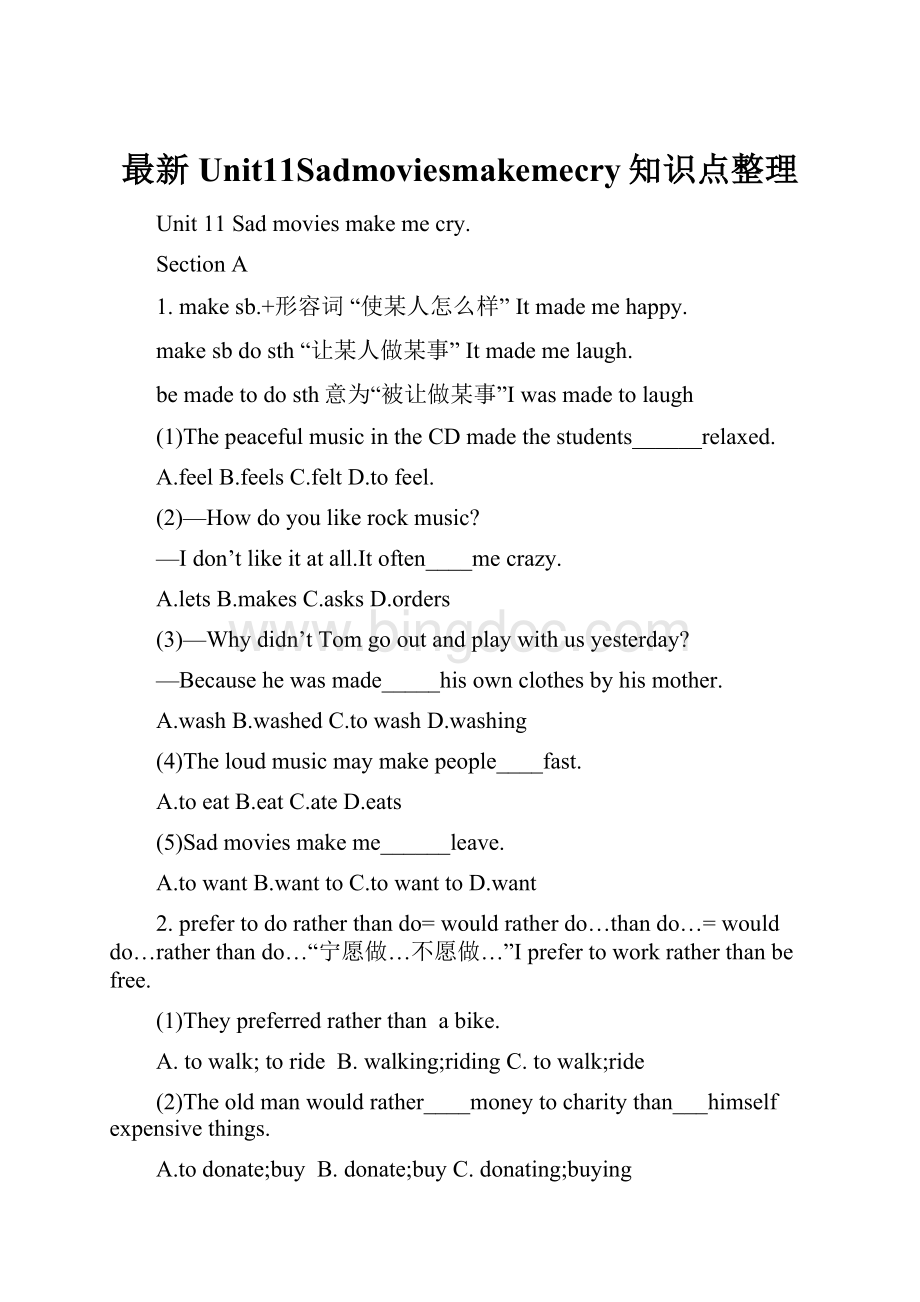最新Unit11Sadmoviesmakemecry知识点整理文档格式.docx
《最新Unit11Sadmoviesmakemecry知识点整理文档格式.docx》由会员分享,可在线阅读,更多相关《最新Unit11Sadmoviesmakemecry知识点整理文档格式.docx(16页珍藏版)》请在冰点文库上搜索。

buyC.donating;
buying
3.sleepy“困倦的”asleep“睡着的”
I’mverysleepyandIwanttogotobed.Hehasfallenasleep.
Hefelt(sleep)andsoonfellasleep.
4.drive意为“迫使”或“驾驶,开车”,过去式是drove,过去分词是driven
Thiscoughisdrivingmemad.
Hungerdrovehimtosteal.
Hedrivestoworkeveryday.
5.辨析:
aloud,loud和loudly
(1)aloud强调为使人听见而发声,声音不一定很大,常与call,read,cry,shout连用,无比较等级。
readaloud朗读Don’treadaloudinthelibrary.
(2)loud强调声音响亮,主要指说话声或笑声等,常与speak,talk,sing,laugh等动词连用.
Speakloud,please,ornoonewillhearyou.
(3)loudly指“大声地,吵闹地”,可指人声、敲门声及其他各种声音,强调声高、喧闹、不悦耳。
Ifeelverymuchannoyedwhentheyargueloudly.
IfyoureadEnglish,IthinkitwillbegoodforyourspokenEnglish.
A.loudB.louderC.loudlyD.aloud
6.两个“如此……以致于……”:
so…that…和such…that…
(1)such+a/an+形容词+可数名词单数=so+形容词+a/an+可数名词单数
(2)such+形容词+可数名词复数
(3)such+形容词+不可数名词
(4)so+形容词/副词
(5)so+many/much/little/few+名词(somany+可数名词复数,意为“如此多
的……”,somuch+不可数名词,意为“如此多的……”,soliltte+不可数名
词,意为“如此少的……”,sofew+可数名词复数,意为“如此少的……”。
)
(1)Thiscoatdoesn'
tfithimwell,ashehas____ahugebodyandthecoatis
____small.
A.so;
suchB.so;
soC.such;
suchD.such;
so
(2)Thismeetingisimportantthatyoumustn’tmissit.
A.veryB.suchC.soD.too
(3)therewas__littlefoodleftthenthatwehadtoturntoalocalfarmforhelp
A.soB.suchaC.suchD.quitea
7.sothat既可以引导目的状语从句,也可引导结果状语从句。
引导目的状语从句时,表示“以便;
为了”,从句中常使用can/could/would/should等情态动词助动词;
引导结果状语从句时,从句中一般不用can或may等词,在sothat前可以用逗号,意思是“因此,所以”。
Youshouldgetupearlysothatyouwon’tbelateforschool.
Shefelldownfromthewallsothatherlegswerebroken.
8.
(1)besuretodosth意为“务必要做某事”表示说话人对对方提出要求。
Besuretoremembertoturnoffthelight.
(2)besureof/aboutsth“对……有把握,相信”
Heissureof/aboutsuccess.
tocomeandmeetmyfamilytonight,willyou?
A.BesureB.TobesureC.BeingsureD.Makesure
9.英语中,疑问词+todo可以做宾语。
Idon’tknowwhattodo.做什么
Idon’tknowhowtodoit.如何做
(1)—Whatdidyourfatherdo?
—Heaskedus_______.
A.howtofixupthebicyclesB.whywefixupthebicycles
C.thatwefixedupthebicyclesD.wheredidwefixupthebicycles.
(2)—Excuseme.Couldyoutellme____gettothenearestpostoffice?
—Sorry,Iamnewhere.
A.howcanIB.howIcouldC.howtoD.whatIcan
10.“the+比较级+主语+谓语,the+比较级+主语+谓语”意为“越……,就越……”
Thebusiersheis,thehappiershefeels.
(1)Themoreyousmile,theyouwillfeel.
A.happyB.happierC.happilyD.morehappily
(2)—Thedoctortoldmenottoeattoomuch,butIfinditdifficult.
—Thedoctorisright,_____youeat,_____youwillbe.
A.Theless;
thehealthierB.Theless;
themorehealthier
C.Themore;
thehealthierD.Themore;
(3)____youstudy,___youcanlearn.
A.Theharder;
themoreB.Themorehardly;
themore
C.Theharder;
thebestD.Themorehardly;
theleast
11.
(1)late可用作形容词或副词,意为“迟到的;
晚的”
Healwaysgetsuplateonweekends.
(2)latest做形容词,表示“最新的;
最近的”,并不是late的最高级。
Doyouhavethelatestnewspaper?
(3)later,副词,意为“过后,稍后”,也是late的比较级形式
Doyouwanttogotogetherlatertoday?
(4)lately副词,意为“最近,近来”,可以与recently互换使用,通常用于现在完成时态。
Maybeyou’reright.Ihavebeentoolazylately.
(1)MyTVisoutoforder(出故障).CanyoutellmewhatisthenewsaboutGuangzhouAsianGames.
A.latelyB.latestC.laterD.late
(2)Haveyoueverbeentothecinema?
A.lateB.laterC.latelyD.latest
12.befriendswithsb意为“成为某人的朋友”
Itwasmylucktobefriendswithhim.
makefriendswithsb意为“与某人交朋友”
IfinditdifficulttomakefriendswithJim.
13.Whydon’tyoudosth?
或Whynotdosth?
意为“你为什么不做某事呢?
”
Whydon’tyoubuyyourmothersomeflowers?
=Whynotbuyyourmothersomeflowers?
Whynot_____yourteacherforhelpwhenyoucan’tfinish____thestorybyyourself.
A.toask;
writeB.toask;
writingC.ask;
writingD.asking;
towrite
14.asksbtodosth.“让某人做某事”;
asksbnottodosth.“让某人不要做某事”
Ourteacheroftenasksustolistencarefullyinclass.
Mymotheraskedmenottogooutatnight.
Jackieaskedme____anything.
A.nottouchB.nottouchedC.nottouchingD.nottotouch
15.
(1)join指参加某个组织;
加入某个群体,并成为其中的一员。
jointheEnglishclub加入英语俱乐部;
jointheParty入党;
joinsb意为“加入到某人当中”joinus加入我们,和我们在一起
(2)takepartin指参加体育运动或比赛。
takeanactivepartinsports.积极参加体育运动
(3)attend指参加会议,婚礼,葬礼,典礼,去上课,上学,听报告等。
He’llattendanimportantmeetingtomorrow.
Iattendedhiswedding.
ThetwinsaretalkingaboutthebookWhoMovedMyCheese.It’sfuntothem.
A.JoinB.joininC.takepartinD.enter
16.leaveout意为“不包括;
不提及;
忽略”。
feelleftout意为“觉得被遗忘了,觉得被忽略了”
Youleftoutthepossibilitythatthetrainmightbelate.
Whenachildfeltleftout,hewouldtrytocrytogethisparents’attention.
17.alongtimeago意为“很久以前”,常用于讲故事的开头。
类似的用法还有:
longlongago很久很久以前;
onceuponatime从前。
Igaveupthatideaalongtimeago.
18.feellikedoingsth=wouldliketodosth=wanttodosth.“想要做某事”
Doyoufeellikesomefishfordinner.
Ifeellikeflyinglikeabird.
Ifeellikegoingforawalkthisafternoon.(改为同义句)
I_____________goforawalkthisafternoon.
I_____________________goforawalkthisafternoon.
19.常见的就近原则的结构有:
①Neither…nor…“既不…也不…”(两者都不)NeitheryounorIlikehim.
②Either…or…“或者…或者…”(两者中的一个)
EitherLil
yoryouareastudent.
③Notonly…butalso…“不但…而且…”
NotonlyyoubutalsoLilylikesthecar.
④Therebe句型Thereisabananaandsomeorangesonthetable.
(1)—DoyouthinkmostofthepeopleinBeijingcantalkwithforeignersinEnglish?
—Yes,Ithinkso.theyoungtheoldarelearningtospeakEnglish.
A.Either;
orB.Neither;
norC.Between;
andD.Notonly;
butalso
(2)Notonlyhe,butalsoyouEnglish.
A.likingB.tolikeC.likeD.likes
(3)NeithermysisternorI____beentoAmericabefore.
A.haveeverB.haveneverC.haseverD.hasnever
20.worryabout相当于beworriedabout“为……而焦虑/担心”
Shealwaysworriesaboutsomelittlethings.
Youreallydon’thavetoworry_____yourweight.Youlookjustright.
A.forB.fromC.withD.about
21.
(1)trytodosth“试图做某事,尽力做某事”
Shetriedtocarrythebasket.
(2)tryone’sbesttodosth=doone’sbesttodosth“尽某人的最大努力做某事”
22.takeone’sposition意为“代替某人的位置”,相当于takeone’splace
Ifyoudon’tgototheplayground,whowilltakeyourpositionforthegame.
23.与start相关的一些搭配
(1)tostartwith意为“首先”在句中常常以插入语的形式出现。
Tostartwith,thecomputerroommustbekeptveryclean.
Ourgrouphadfivemembers,tostartwith.刚开始,我们小组只有五个人。
(2)startwith可表示“从……开始”;
“先从某事做起”,与begin...with是同义词组。
反义词组是endwith“以……结束”。
Themeetingendedwithaspeechgivenbythechairman.会议以主席的讲话结束。
Hewantedtostart/beginwiththesmallestcountryandendwiththelargestone.
他打算先去最小的国家,最后去最大的国家。
24.so+do+sb和so+sb+do
(1)sodoI意为“我也是”,前后两句主语不是同一个人,主谓倒装。
=Me,too
—Helikespopmusic.—SodoI.
(2)neither/nordoI,意为“我也不是”,前后两句主语不是同一个人,主谓倒装。
=Me,neither
—Hedoesn’tlikepopmusic.—Neither/NordoI.
(3)soIdo意为“我的确如此”,前后两句主语是同一个人,主谓不倒装。
—Jimswimswell.—Sohedoes.
—MymotherandIwillgotoShanghaithissummer.
—.Shallwegotogether?
A.SodoIB.SocanIC.SoamID.SowillI
25.tellsbtodosth“告诉某人做某事”;
tellsbnottodosth“告诉某人不要做某事”Tellthechildrennottomakemuchnoise.
tellsbsth“告诉某人某事”;
tellsbaboutsth“告诉某人关于某事”
Tellmeyourtelephonenumber,please.
Pleasetellmeabouthislife.
26.cleanoff意为“把……擦掉”。
cleanout把……内部彻底打扫干净
cleanup打扫干净,代词都必须放中间。
Afterclass,studentsaresupposedtocleanthechalkofftheblackboard.把黑板上的粉笔字擦掉
Couldyou_____thedust____thepictures?
A.clean;
offB.take;
offC.turn;
offD.cut;
up
SectionB
1.remain的用法:
(1)是系动词时意为“保持,仍是”,后接形容词.类似的动词还有keep
Theroomremainscoolallsummer.
(2)是实义动词时意为“逗留、被遗留”,相当于stay
Afewpearsremainonthetrees.
Sheremainedinherofficeallafternoon.
Thetownwasbadlydestroyedinthewar,butthelibrary.
A.stoodB.layC.keptD.remained
2.searchfor意为“搜寻,找寻”,后面的宾语是寻找的目标。
search还可作及物动词,后接搜寻的地点或物品时,意为“搜查某处或某物”;
后面跟人时,指“搜某人的身”。
Thepolicesearchedforthelostboyyesterday.
Hesearchedhispockets,butfoundnothing.
Thepolicemanissearchingthehouse.
3.辨析:
howoften,howlong与howsoon
(1)howoften“多久一次”,对频率副词提问,常用于一般现在时
(2)howlong“多长时间”,对“for+时间段”或“since+时间点”提问,常用于现在完成时
(3)howsoon“多久以后将•••”,对“in+时间段”提问,用于一般用将来时态。
(1)—__________doyoureadEnglishbooks?
—Twiceaday.
A.HowmanyB.HowmuchC.HowlongD.Howoften
(2)—willyoubeaway?
—Intwoweeks.
A.WhattimeB.HowsoonC.HowoftenD.Howlong
(3)—____haveyoulivedwithyourgrandparents?
—Aboutthreeyears.
A.HowlongB.HowmanyC.HowsoonD.Howoften
4.区分spend,pay,cost和take
(1)人+spend(spent)+时间/金钱+(in)doingsth或onsth
Ispentfivedollars(in)buyingthebook.Ispentfivedollarsonthebook.
(2)人+pay(paid)+金钱+forsthIpaidfivedollarsforthebook.
(3)物+cost(cost)+人+金钱Thebookcostmefivedollars.
(4)Ittakes(took)+人+时间+todosth.
Ittookmefivehourstofinishhomework.
(1)I’mafraidit’llyoumuchtimetow